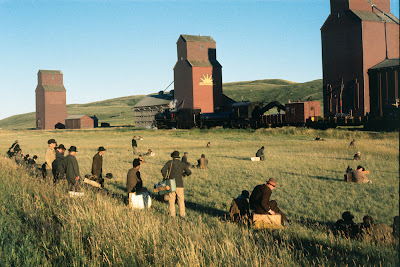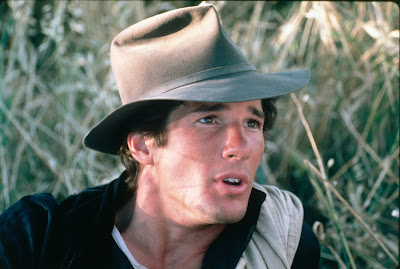3/22/2010
Criterion Collection Blu-ray Review: Days of Heaven (1978)
“You know how people are-- you tell them something, they start talking,” Linda (Linda Manz) explains near the beginning of Terrence Malick's Badlands follow-up Days of Heaven.
And throughout Heaven, Malick adheres to this belief as Linda's youthful, heavily East Coast accented voice that narrates the goings-on from her limited point-of-view and intellectual understanding, serves as the most consistent human sound heard during the 94 minute running time.
Since Linda reveals little, very little talking ensues which suits the painterly pastiche perfectly. Swept up in the scope of the film-- grandly established by the romantic Camille Saint-Saëns theme that accompanies Malick's opening credit sequence-- pre-World War I era photos fill the frame until finally the black and white images fade out and Heaven begins, matching the previous style in an intuitive segue from still to moving pictures.
The natural progression in media flows so perfectly that-- especially giving the lush beauty for which the Oscar winning film is known as a true visual cinematic treasure-- Terrence Malick's Days of Heaven could be called one of American history’s quintessential moving pictures.
Deceptively simplistic, Heaven can be very simply summed up as a work that chronicles the relationship between a trio of close knit characters who happen to cross paths with a fourth just as the United States entered the first world war in 1916-17.
As an impoverished worker who clocks his boss at a Chicago factory and ends up accidentally killing him over an undisclosed disagreement we primarily see and hear simply in murmurs, Richard Gere packs up his younger sister Linda and his girlfriend, Abby (Brooke Adams) who masquerades as his sister on the road to prevent tongues wagging and journeys to the Texas Panhandle.
Working the harvest on a handsome but lonesome farmer's land, Gere's scheming, hot-headed Bill cooks up a ruthless plan worthy of Henry James and Thomas Hardy when he discovers that the young farmer (Sam Shepherd) is keeping the fact that he’s fatally ill a secret.
While this alone would be of interest to desperate souls, when Bill also recognizes that the father has become “stuck on” the beguiling dark-haired Abby, Bill’s mind begins racing even faster than the tractors in the field.
Still keeping up the sibling charade even after another worker proves why Linda's belief in quietness pays off when he accuses Abby of keeping her brother “warm at night,” and tired of working from when the sun first came up until it went back down again, Bill coaxes Abby into getting involved with the wealthy farmer who intends to make her his wife.
Willing to sacrifice the woman he loves for the chance to have an easier life, Bill and Abby's duplicitous decision inevitably proves that days of heaven are as fleeting as harvest season as the truth gets tumbled like weeds, relationships grow and are hastily cut short, and unforeseen spoilers like locusts and lies that cannot be erased begin to threaten everything.
Essentially a masterpiece of exquisite cinematography, despite criticisms for its basic structure with nary a twist in sight, Heaven's impact in the field of motion picture photography cannot be understated. Filled with Nester Almendros magic hour heavy cinematography, the Cuban born Truffaut collaborator who wasn't allowed to manually shoot anything due to union rules sought inspiration from classic painters like Wyeth and Hopper along with the same period photography that opened the picture.
When work on another Truffaut film beckoned and he had to leave Heaven, he recruited friend and fellow groundbreaking cameraman, Haskell Wexler to come aboard. Working side-by-side with Wexler for a week, Almendros ensured the transition would be so seamless that to this day, there's still some hard feelings over Wexler’s “additional photography” credit and exclusion from sharing the Oscar with Almendros.
Piecing it together for two years to make the type of old fashioned period film that replaced gritty realism with artificial nostalgia for which he was looking, Malick's work moved away from the tendency to use filters, tricks, or glossy Hollywood techniques in favor of a sparse color palette of rich, deep, dark browns of the Texas panhandle and golden fires on an autumn evening to transform celluloid into its own museum worthy presentation.
From a pure visceral standpoint, Malick's Heaven hasn't been matched in his career in terms of it ability to stop you completely, arresting all of your senses which certainly comes through in this exquisite Blu-ray Criterion transfer that has removed all traces of dirt, debris and scratches by giving us a smooth 1.78:1 widescreen aspect ratio and richly balanced surround sound derived from a cleaned up version of its original magnetic 4.1 audio track.
Eliminating the hisses and pops from the old material, the high definition clarity in terms of both picture and sound is a completely immersive experience, as crickets chirp from behind you in rear speakers, wind blows steadily throughout and the train they hitch a ride on is so lifelike it feels as though you're going to depart right from your family room.
Pure cinema purely preserved to a much more satisfying effect than its previous Paramount DVD release, Malick's work arrives on Criterion just one month after the Cannes award winning film Paris, Texas written by Heaven's farmer joined the collection's Blu-ray ranks.
And although from a storytelling standpoint, Malick managed to top himself in his more recent offerings The Thin Red Line and in the vastly underrated effort The New World, seeing Days of Heaven again in the era of so much useless cinematic noise and overblown effects reminds you just how powerful silence can be, especially when filtered by the dedicated digital magicians from The Criterion Collection.
Text ©2010, Film Intuition, LLC; All Rights Reserved. http://www.filmintuition.com
Unauthorized Reproduction or Publication Elsewhere is Strictly Prohibited and in violation of the Digital Millennium Copyright Act.
FTC Disclosure: Per standard professional practice, I received a review copy of this title in order to evaluate it for my readers, which had no impact whatsoever on whether or not it received a favorable or unfavorable critique.
Labels:
Blu-ray Review,
Criterion Collection















